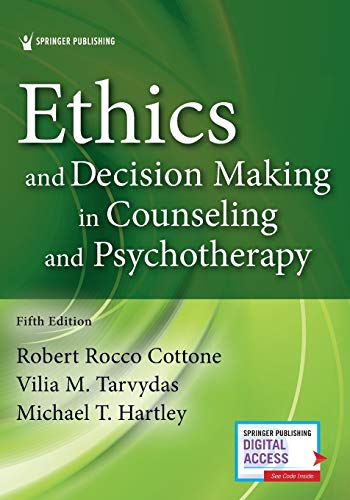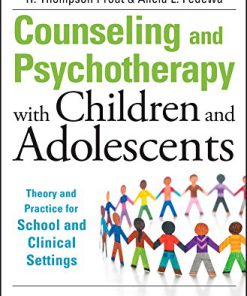Ethics and Decision Making in Counseling and Psychotherapy 5th edition by Robert Roco Cottone, Vilia Tarvydas, Michael Hartley 0826135285 9780826135285
$50.00 Original price was: $50.00.$25.00Current price is: $25.00.
Ethics and Decision Making in Counseling and Psychotherapy 5th edition by Robert Roco Cottone, Vilia M. Tarvydas, Michael T. Hartley – Ebook PDF Instant Download/Delivery: 0826135285, 9780826135285
Full download Ethics and Decision Making in Counseling and Psychotherapy 5th edition after payment

Product details:
ISBN 10: 0826135285
ISBN 13: 9780826135285
Author: Robert Roco Cottone, Vilia M. Tarvydas, Michael T. Hartley
Ethics and Decision Making in Counseling and Psychotherapy 5th Table of contents:
PART I OVERVIEW OF ETHICS AND DECISION MAKING IN COUNSELING AND PSYCHOTHERAPY
1. Introduction to Ethical Issues and Decision Making in Counseling and Psychotherapy
Introduction
Defining Ethics
Professional Ethics Versus Legally Mandated Ethics
Ethics Governance
Decision Making Skills
Conclusion
References
2. The Mental Health Professions and Counseling Specialties
Introduction
Counseling and Psychology: Two Closely Related But Now Distinct Mental Health Professions
Licensing and Credentialing in the Mental Health Professions
Counseling
Psychiatry
Psychology
Marriage and Family Therapy
Psychiatric Nursing
Social Work
Conclusion
References
3. Value Issues in Counseling
Introduction
Values
Morals, Ethics, and Values
Values in Counseling: Historical Perspective
Values of Counselors and the Counseling Relationship
Values, Cultural Worldviews, and Multiculturalism
Values Clarification
Values Conflict Resolution
Strategies for Counselors
Conclusion
References
4. Ethical Decision Making Processes
Introduction
Ethical Judgment
A Review of Ethical Decision Making Models
Theoretical or Philosophical Models of Individual Choice
Quantification as a Means to Individual Choice
Practice-Derived Models of Individual Choice
Models of Relational Influence
Empirical Findings on Models or Premises
Willingness or Resoluteness as a Factor in Decision Making
The Tarvydas Integrative Decision Making Model of Ethical Behavior
Conceptual Origins
Themes and Attitudes
Stages and Components
Practicing the Tarvydas Integrative Model
The Theoretical Contribution of the Tarvydas Model
Cottone’s Social Constructivism Model of Ethical Decision Making
Applying the Social Constructivism Model of Ethical Decision Making
“Objectivity in Parentheses”
Conflicting Consensualities
The Interpersonal Process of Negotiating, Consensualizing, and Arbitrating
Response to a Challenge
The Social Constructivism Process of Ethical Decision Making
“A Truth” Versus “The Truth”
How the Social Constructivism Model Interfaces with Multiculturalism
Concluding Words About the Social Constructivism Model
Conclusion
References
5. Introduction to Ethical Principles in Counseling
Introduction
Importance of Ethical Principles to Mental Health Professions
The Principles
Respect for Autonomy
Beneficence and Nonmaleficence
Justice
Fidelity
Veracity
Principles, Challenges to the Principles, and Codes of Ethics
Beyond Ethical Principles: Defining Ethical Standards
Conclusion
References
6. Introduction to Ethical and Legal Standards in Counseling and Psychotherapy
Introduction
The Relationships Between Ethics and the Law
Ethical and Legal Standards in Mental Health Practice
Confidentiality and Privacy
Privileged Communication
Counselor Roles and Relationships With Clients and Other Involved Parties
Informed Consent
Professional Responsibility
Competence
Decision Making in Context
Conclusion
References
PART II ETHICAL AND LEGAL CHALLENGES ACROSS MENTAL HEALTH PROFESSIONS
7. Clinical Mental Health Counseling
Introduction
History of Clinical Mental Health Counseling
Credentialing and Clinical Mental Health Counseling
Independence of Clinical Mental Health Counselors
Defining the Specialty, Setting, and Clients
Issues of Significance to the Specialty
Professional Differentiation
Managed Care and Third-Party Insurance
Assessment and Diagnosis of Mental Disorders
Competence to Provide Clinical Mental Health Counseling
Informed Consent and Professional Disclosure
Privacy and Confidentiality in Mental Health Counseling
Duty to Warn and Exceptions to Confidentiality
Roles and Relationships With Clients
Professional Responsibility and Interdisciplinary Collaborations
Cultural Diversity and Social Justice
Decision Making in Context
Conclusion
References
8. School Counseling
Introduction
Defining the Specialty, Setting, and Clients
The School Counselor’s Role
Clients
Counseling Process
Group Work
Evaluation, Assessment, and Interpretation
Ethical and Legal Issues
Confidentiality and Privileged Communication
Confidentiality
Privileged Communication
Informed Consent
Informing and Facilitating Consent
Client Autonomy
Roles and Relationships With Clients
Potentially Detrimental Relationships
Values
Counselor Competence
Counselor Competency, Skill Monitoring and Wellness
Competence and Technology
Code Comparisons
ASCA Position Statement on Confidentiality
Employer Policy and Expectations
Code Comparisons
Issues of Diversity
Decision Making in Context
Decision Making in Context
Conclusion
References
9. Couple, Marital, and Family Counseling
Introduction
Defining the Specialty, Setting, and Clients
Ethical and Legal Issues
Confidentiality and Privileged Communication
Informed Consent
Roles and Relationships with Clients
Responsibility
Values
Counselor Competence
Code Comparisons
Issues of Diversity
Decision Making in Context
Conclusion
References
10. Rehabilitation Counseling
Introduction
History of Rehabilitation Counseling
Credentialing and Rehabilitation Counseling
Diversification of Rehabilitation Counseling
Defining the Specialty, Setting, and Clients
Issues of Significance to the Specialty
Professional Differentiation
Advocacy and Empowerment
Forensic and Indirect Assessment
Competence
Informed Consent and Assent
Privacy and Confidentiality
Roles and Relationships
Primary Responsibility and Collaboration
Cultural Diversity and Social Justice
Decision Making in Context
Conclusion
References
11. Addictions Counseling
Introduction
Defining the Specialty, Setting, and Clients
Brief History of Addictions Treatment in America
Contemporary Addictions Treatment
Substance Abuse Counseling: A Profession or a Specialty?
Counselor Competency
Setting Issues
Counseling Adolescents and Minors
Ethical and Legal Issues
Confidentiality and Privileged Communication
Informed Consent
Roles and Relationships with Clients
Responsibility
Values
Code Comparisons
Issues of Diversity
Ethical Decision Making in Context
Conclusion
References
12. Career Counseling
Introduction
Defining the Specialty, Setting, and Clients
Specialty
Settings
Clients
Issues of Significance to the Specialty
Ethical and Legal Issues
Confidentiality and Privileged Communication
Roles and Relationships With Clients
Informed Consent
Professional Responsibility
Values
Counselor Competence
Career Counseling Competencies
Ethical Standards and Code Comparisons
Issues of Diversity
Individual Versus Collectivist Cultures
Assessment of Culturally Diverse Populations
Gay and Lesbian Clients
Decision Making in Context
Conclusion
References
13. Group Counseling
Introduction
Defining the Specialty, Settings, and Clients
Issues of Significance to the Specialty
Ethical and Legal Issues
Confidentiality and Privileged Communication
Informed Consent
Roles and Relationships With Clients
Responsibility
Values
Counselor Competence
Code Comparisons
Issues of Diversity
Decision Making in Context
Conclusion
References
PART III ORGANIZATIONAL, ADMINISTRATIVE, AND TECHNOLOGY ISSUES
14. Ethical Climate
Introduction
Organizational Culture
Culture
Ethics and Organizational Culture
Organizational Climate and Ethical Climate
Accountability to the Organization and Decision Making
Impaired Professionals
Burnout and Job Stress
Boundary and Harassment Issues in Employment and Supervision
Substance Abuse
Mobbing
Whistle-Blowing
Conclusion
References
15. Office and Administrative Practices
Introduction
The Layout of the Office
Fee Setting, Billing, and Collections
Agreements With Nonprofessional Staff Members
Advertising
Credentials
Maintenance of Records and Files
Communications With Other Professionals
Disagreements With Employers or Supervisors
Conclusion
References
16. Ethics of Counseling Supervision
Introduction
Defining the Role and Setting of Clinical Supervision
Competence and Clinical Supervision
Multiple Roles and Relationships in Supervision
Evaluation and Feedback in Supervision
Gatekeeping and Documentation in Supervision
Diversity and Cultural Competence in Supervision
Informed Consent and Supervision Contracts
Privacy and Confidentiality in Supervision
Online Supervision
Legal Issues in Supervision
Ethical Decision Making
Conclusion
References
17. Technology Ethics and Distance Counseling
Introduction
Counseling and the Digital Revolution
Evolution of Counseling Technology
Competence and Distance Counseling
Informed Consent and Distance Services
Privacy and Confidentiality in the Digital Age
Virtual Boundaries in the Digital Age
Professional Conduct and e-Professionalism
Access and Accessibility
Computer-Assisted Assessment
Benefits of Computer-Assisted Test Administration
Limitations of Computerized Administration
Computer-Generated Assessment and Interpretation
Conclusion
References
PART IV CONCLUSION
18. The Ethical Professional Counselor and Psychotherapist
Introduction
Consequences of a Breach of Ethics for the Mental Health Professional
Consequences of a Breach of Ethical Standards for the Client
Filing a Complaint to a Licensure Authority
The Development of the Ethical Mental Health Professional
Decision Making in Context
People also search for Ethics and Decision Making in Counseling and Psychotherapy 5th:
ethics and decision making in counseling and psychotherapy 5th edition
ethics and decision making in counseling and psychotherapy pdf
ethics and decision making in counseling and psychotherapy 4th edition
values and ethics in counseling real-life ethical decision-making
ethics in decision making
Tags: Ethics, Decision Making, Counseling, Psychotherapy, Robert Roco Cottone, Vilia Tarvydas, Michael Hartley
You may also like…
Business & Economics
Relationships & Lifestyle - Diet & Nutrition
Business & Economics Engineering
Engineering Economics Financial Decision Making for Engineers 5th Edition Niall Fraser
Politics & Philosophy - Social Sciences
Politics & Philosophy - Social Sciences
Business & Economics - Responsibility and Business Ethics
Education Studies & Teaching












